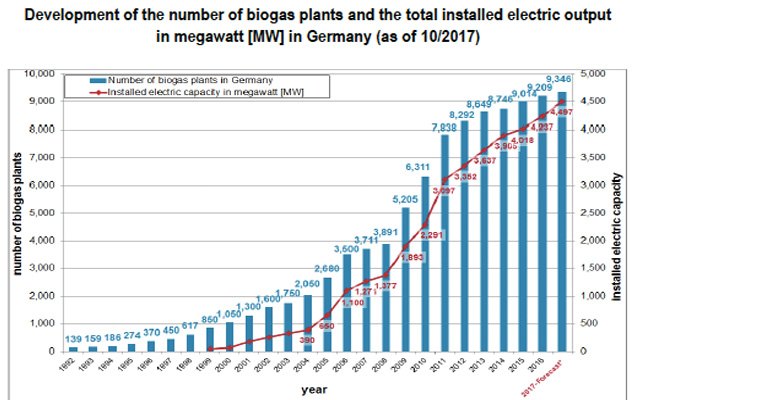Bioenergy is Europe's leading renewable energy source. According to Eurostat data and calculations made by the European Biomass Association (AEBIOM), bioenergy will be able to supply 11% of the final energy consumption in 2017. An additional 7% comes from the other renewables, while the rest (82%) still comes from fossil fuels. Within this context, for 66 days the EU can run on renewable energies, 41 days of which are supplied by bioenergy—from November 21 to the end of the year.

For Germany, its Bioenergy Day is November 23, two days after the European average. Biomass is the most important renewable energy source in Germany accounting for approximately 59 percent of renewable sources comes from the use of biomass for energy in the electricity, heating and transport sectors.
To illustrate the often overlooked importance of bioenergy, the German Bioenergy Association (BBE) has placed it in relation to the total energy demand. According to the calculations, as of November 23 to the end of the year, Germany could run entirely on biomass sources.
Bioheat and biopower
According to BBE, it is the heating market that the special role of bioenergy is obvious – more than half of the energy consumption in Germany is for heat and bioenergy has an 11.8 percent share of the heat market.

With an annual production of 1.9 million tonnes 2016, the country is, according to AEBIOM, the largest producer of wood pellets in Europe. However, according to Deutscher Energieholz- und Pellet-Verband e.V. (DEPV) this is set to rise to 2.3 million tonnes 2017 whereas installed capacity is at 3.4 million tonnes. Pellet consumption is also set to rise for to over 2.2 million tonnes in 2017.
Biomass is also the second largest source of renewable electricity in terms of electricity consumption at 8.6 percent after wind power. Biogas is a major source with Germany having the largest biogas plant fleet in Europe, over 9 200 installations. According to figures from the German Biogas Association (Fachverband Biogas), Germany has an installed biogas capacity of almost 4.5 GWe.

At just under 90 percent of all renewables in transportation, biofuels also remain the main “pillar of climate-friendly mobility” in the transport sector, even though their share has fallen from 7.2 percent to 4.6 percent in the last 10 years.
Of economic importance
BBE highlight that bioenergy is a significant economic factor for Germany. The advantages of bioenergy are its enormous flexibility because it can not only be used for electricity, heat or biofuel production but it is on demand and dispatchable regardless of the weather or time of day. The use of domestic biomass replaces imports of fossil fuels and thus appreciably contributes to increasing energy supply security.
It also generates enormous economic impetus through the promotion of regional value chains, the strengthening of small and medium-sized enterprises in particular, and the revitalization of rural areas. According to Bundesministerium für Wirtschaft und Energie and Agentur für Erneuerbare Energien, this was worth approximately EUR 10.5 billion with more than 113 000 people finding work in Germany through bioenergy.
BBE notes that the share of bioenergy in primary energy consumption could be increased fourfold by 2050 by “resolutely mobilizing the sustainable potential” which according to Fachagentur Nachwachsende Rohstoffe is currently just over 7 percent – with corresponding effects for more climate protection, more employment and empowerment of the business location Germany.
EU pillar of energy transition
Bioenergy is also the pillar of the energy transition in Europe. So the EU celebrated just ahead of Germany on November 21 its “EU Bioenergy Day”. For 41 days, therefore, the EU could meet its current energy requirements exclusively via biogenic energy sources.

Individual member states such as Sweden (132 days), Finland (121 days) or Latvia (112 days) are already significantly further. The placement of Germany in the midfield of the EU Member States reveals the potential for improvement.
Fakta
About European Bioenergy Day
The European Bioenergy Day campaign is powered by the European Biomass Association (AEBIOM) and relayed across Europe by both national and international partners supporting the belief that bioenergy is more than a renewable energy source, but a reliable path that will lead Europe to achieve its renewable energy transition in the shortest span of time. The campaign will last 66 days, starting from November 21 through the end of the year. This is a symbolic date on which the European Bioenergy Day was celebrated by organizing the European Bioenergy Future Conference, held in Brussels, Belgium on that date.


